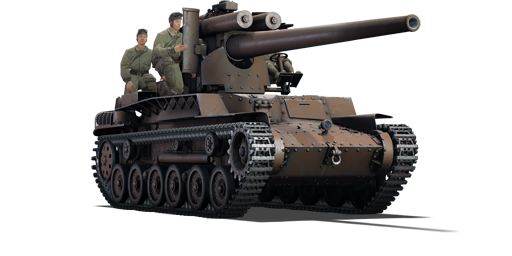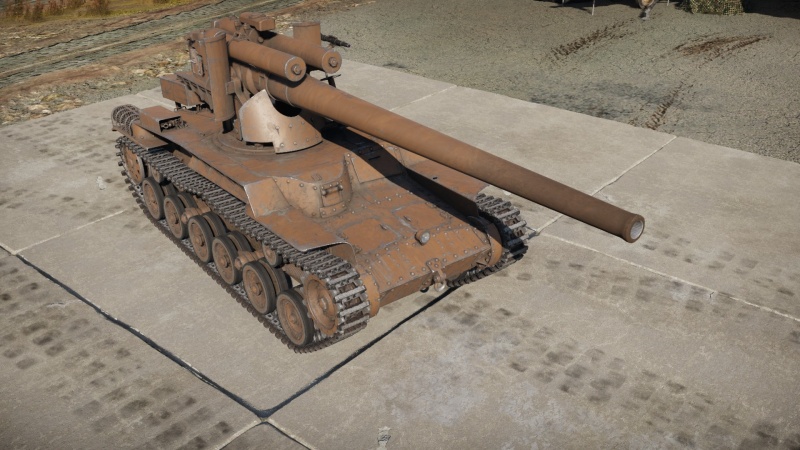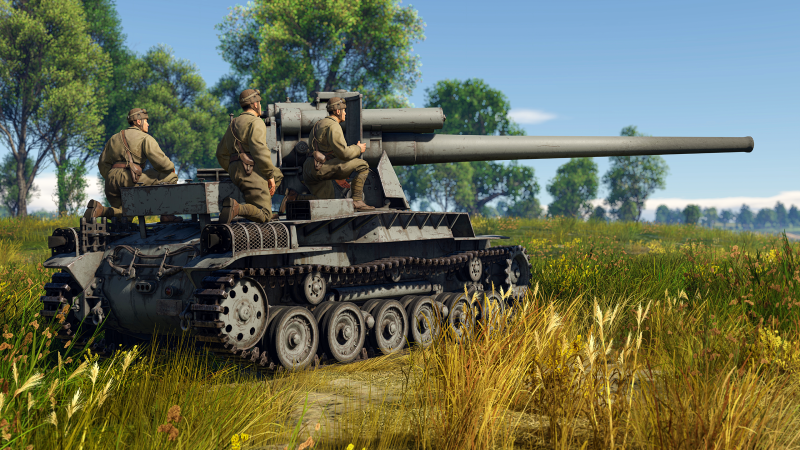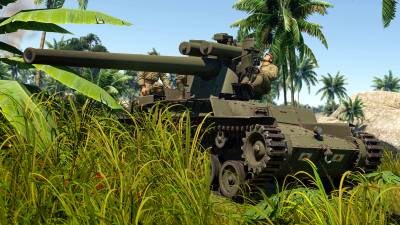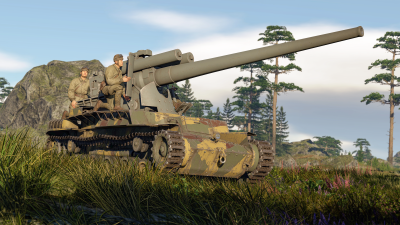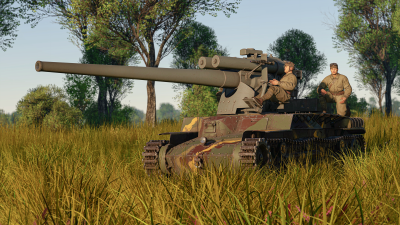Difference between revisions of "Chi-Ha LG"
Colok76286 (talk | contribs) (Added TankManufacturer template) |
Colok76286 (talk | contribs) (→Ammunition: Converted to transclusion) |
||
| Line 84: | Line 84: | ||
==== Ammunition ==== | ==== Ammunition ==== | ||
| − | { | + | {{:10th Year Type (120 mm)/Ammunition|Ordinary Mod.1, C.P.(BF)}} |
| − | |||
| − | |||
| − | |||
| − | |||
| − | |||
| − | |||
| − | |||
| − | |||
| − | |||
| − | |||
| − | |||
| − | |||
| − | |||
| − | |||
| − | |||
| − | |||
| − | |||
| − | |||
| − | |||
| − | |||
| − | |||
| − | |||
| − | |||
| − | |||
| − | |||
| − | |||
| − | |||
| − | | Ordinary | ||
| − | |||
| − | |||
| − | |||
| − | |||
==== [[Ammo racks]] ==== | ==== [[Ammo racks]] ==== | ||
Revision as of 20:14, 30 January 2023
| This page is about the Japanese medium tank Chi-Ha LG. For other versions, see Chi-Ha (Family). |
Contents
Description
The Type 97 Chi-Ha Long Gun / Long 12cm SPG (長十二糎自走砲) is a rank II Japanese tank destroyer with a battle rating of 2.7 (AB/RB/SB). It was introduced in Update "Raining Fire".
This one-off prototype was made with a 12cm cruiser gun placed on the hull of a Chi-Ha to provide firepower in the defence of the Japanese homeland if the Americans invaded.
General info
Survivability and armour
While it shares the hull of a regular Chi-Ha, the gun crew is almost completely exposed as the turret got removed in replacement of a naval gun. The gunshield itself is quite small and offers only protection against rifle calibre fire.
The best way of protecting the gun and keeping it operational is angling the gun itself when taking MG fire so that the gunner is always behind the breech, this will expose other gun crew but when taking close-range MG fire, there's not much else to do other than attempt to retreat while keeping the gun operational.
Armour type:
- Rolled homogeneous armour (Hull)
- Structural steel (Gun breech and mount)
| Armour | Front (Slope angle) | Sides | Rear | Roof |
|---|---|---|---|---|
| Hull | 25 mm | 25 mm | 20 mm | |
| Gun shield | 10 mm Gun shield 10 mm Gun mantlet |
Notes:
- Suspension wheels, tracks, and torsion bars are 15 mm thick.
Mobility
While the hull and engine are the same, most non-essentials were scrapped from the Chi-Ha 12cm to reduce weight so the main gun wouldn't weigh an additional toll to the hull. After removing the turret, radio equipment, MGs and cuts in the hull, the tank comes down to almost the same weight of a regular Chi-Ha and hence performs the same.
| Game Mode | Max Speed (km/h) | Weight (tons) | Engine power (horsepower) | Power-to-weight ratio (hp/ton) | |||
|---|---|---|---|---|---|---|---|
| Forward | Reverse | Stock | Upgraded | Stock | Upgraded | ||
| Arcade | 44 | 21 | 14.8 | 241 | 324 | 16.28 | 21.89 |
| Realistic | 40 | 19 | 150 | 170 | 10.14 | 11.49 | |
Modifications and economy
As a glass-cannon sniper with hefty reload, modifications are down to personal preference, either get engine performance upgrades to get to a sniper spot sooner or get the gun upgraded so aiming it down on a target doesn't take too much time.
Armaments
Main armament
This gun shouldn't be confused with the one on the Chi-Ha Short Gun, while said Chi-Ha has a short gun meant for transport ships on anti submarine & close range fire range, the 12cm/45 10th Year was used as coastal emplacements and outfitted on early Japanese cruisers. It offers a high velocity gun to fling HE over the map with quite an ease.
| 120 mm 10th Year Type | Turret rotation speed (°/s) | Reloading rate (seconds) | |||||||||||
|---|---|---|---|---|---|---|---|---|---|---|---|---|---|
| Mode | Capacity | Vertical | Horizontal | Stabilizer | Stock | Upgraded | Full | Expert | Aced | Stock | Full | Expert | Aced |
| Arcade | 10 | -10°/+15° | ±60° | N/A | 8.80 | 12.19 | 14.80 | 16.37 | 17.41 | 13.00 | 11.50 | 10.60 | 10.00 |
| Realistic | 5.95 | 7.00 | 8.50 | 9.40 | 10.00 | ||||||||
Ammunition
| Penetration statistics | |||||||
|---|---|---|---|---|---|---|---|
| Ammunition | Type of warhead |
Penetration @ 0° Angle of Attack (mm) | |||||
| 10 m | 100 m | 500 m | 1,000 m | 1,500 m | 2,000 m | ||
| Ordinary, Mod.1 | HE | 25 | 25 | 25 | 25 | 25 | 25 |
| C.P.(BF) | SAPCBC | 103 | 102 | 95 | 87 | 80 | 74 |
| Shell details | ||||||||||||
|---|---|---|---|---|---|---|---|---|---|---|---|---|
| Ammunition | Type of warhead |
Velocity (m/s) |
Projectile mass (kg) |
Fuse delay (m) |
Fuse sensitivity (mm) |
Explosive mass (TNT equivalent) (kg) |
Ricochet | |||||
| 0% | 50% | 100% | ||||||||||
| Ordinary, Mod.1 | HE | 825 | 20.4 | 0.3 | 0.1 | 1.97 | 79° | 80° | 81° | |||
| C.P.(BF) | SAPCBC | 825 | 20.4 | 1.2 | 19 | 1.87 | 48° | 63° | 71° | |||
Ammo racks
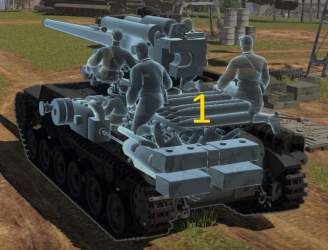
| Full ammo |
1st rack empty |
Visual discrepancy |
|---|---|---|
| 10 | 1 (+9) | No |
Note:
- Shells are modeled individually and disappear after having been shot or loaded.
Usage in battles
With its powerful gun but lacking protection, the Chi-Ha LG should be played as a sniper. The good muzzle velocity and powerful shells (with up 1.7 kg of explosive filler) make it a threat for every vehicle. However, being able to carry only 10 shells is a disadvantage. Staying near captured points is ideal to refill your ammunition storage when necessary but it will expose you to artillery strikes. With its massive gun and gun breech, enemy tanks will likely target you first, so stay behind bushes or cover. Also, staying near buildings or trees will give the enemy planes a harder time to see you. Avoid open fields. With its open gun shield, armour is non existent. Even 7,92 mm machine guns can knock out the whole crew (only the driver is protected). When no machine guns or autocannons are used by the enemy, the Chi-Ha LG can get very survivable. If the enemy fires a shell at you, they will most likely hit the driver or one of the two loaders, leaving the rest of the crew alive. Despite having a 120 mm gun with good muzzle velocity, it only has 103 mm of penetration: that means the "point and click" option won't always work, you have to aim shots precisely.
Enemies worth noting:
- M4A3 (105): This low-rank Sherman has strong enough frontal armour, to withstand a 120 mm shell. Try shooting at the turret around the gun mantlet. It won't be easy, but a successful hit will reward you with a knock out.
- KV-1 (L-11): This heavy tank could be a hard nut to crack for the LG if faced frontally. When the KV-1 is unangled, try to shoot the driver's port or the armour on the gun mantlet. When angled, shoot the armour near the gun mantlet only.
Pros and cons
Pros:
- High shell velocity
- Quick reload for a gun of its size
- The C.P.(BF) combines the penetration of APHE and the splash-damage capability of HE. The explosion of a non-penetrating hit to a cupola can wreck the roof armour of a tank
- Versatile Chi-Ha chassis
- Quite fast (up to 44 km/h | 39 km/h), allowing it to get to certain spots in time
- Great turning ability in low gear
- Lovely climbing ability, Good to get in sniper locations
Cons:
- Gun shield is small and thin, doesn't provide too much cover
- Only one crew member is inside the tank
- Vehicle can be destroyed due low caliber MG fire even with full crew
- Two loader crew in the back of the tank have no direct cover
- 10 shells max
- Ammunition is very exposed, one lucky shot can destroy the vehicle
- Shells might have some trouble penetrating the front armour of some tanks, especially in uptiers
History
As the Chi-Ha was very structurally sound and is able to withstand high amounts of additional weights while maintaining stable stress-levels and speed. This made it a great testbed for heavier weapons and equipment.
- Design
One of these additions/variants was a Japanese Navy Construction Headquarters refit of the Chi-Ha to carry the 12 cm/45 10th Year naval cannon at the end of the war. Information of the development of the Chi-Ha Long Gun is scarce but what is certain is that they were to be constructed in defence of the homeland in-case of the highly probable American invasion, target allied armour and reposition after being shown.
Very slight changes took place with the most notable being the addition of a muzzle brake. The Chi-Ha would be simply used as a moving platform and hence all the default equipment from turret, hull machine gun, radio equipment and other interior pieces were stripped in exchange for ammo storage. The 12cm cannon was bolted on the hull and used similarly to the Archer in practice, firing from the rear to maintain recoil levels while firing.
The crew consisted out of 5 people; the driver, tank commander, two gun crew, and an ammunition carrier. The cannon could elevate 20° and decline to -10°. Operating the cannon wasn't an easy task either due to the set-up of the gun on the plain back of the Chi-Ha. On top of the fire rate of 2 shells per minute, this would take a massive toll once in actual combat.
- Usage
The first test took place in April of 1945 on mobility and firing. 30 shots were fired at varying distances with upgraded cannon sights, with the longest shot during the test being around 3 km. No discrete information about penetration capabilities were recorded or made it to the post-war reports.
While production plans were approved, no further vehicles beyond the prototype were recorded as being built or near completion by the end of the war.
The prototype recorded by the US was found with the Yokosuka 15th unit and is the only footage on said vehicle.
Devblog
This curious prototype of a self-propelled gun was discovered in the territory of the Yokosuka naval base after Imperial Japan surrendered in WWII. The 120 mm naval gun was installed on a turntable mounted to the chassis of a Type 97 Chi-Ha medium tank. It was obvious, that the self-propelled gun was assembled in a rush - the high losses of Japan in the final stages of WWII and a shortage of military production forced the army and naval commands to look for any way to protect the island metropolia of the Empire from the threat of an Allied landing.
The self-propelled gun did not have any protection, the large calibre of the cannon and the weak platform of the medium tank presupposed firing mainly direct fire and in the rather limited arcs of forward and backward to avoid overturning due to the heavy recoil. Despite all these shortcomings, such vehicles were supposed to go into series for rapid deployment in dangerous sectors of the coastal defense line for the Japanese islands and firing at a line-of-sight distance at approaching enemy forces.
Media
- Skins
- Images
- Videos
See also
- Related Development
- Directly Related:
- Type 97 Chi-Ha (base hull)
- Related:
- Type 97 Chi-Ha Short Gun (another navy variant)
- Tanks of comparable role, configuration and era
External links
| Yokosuka Naval Arsenal (横須賀海軍工廠) | |
|---|---|
| Destroyers (DD) | |
| Momi-class | IJN Momi |
| Light Cruisers (CL) | |
| Mogami-class | IJN Suzuya |
| Heavy Cruisers (CA) | |
| Myōkō-class | IJN Myoko |
| Battlecruisers (BC) | |
| Kurama-class | IJN Kurama |
| Amagi-class | IJN Amagi |
| Battleships (BB) | |
| Fusō-class | IJN Yamashiro |
| Nagato-class | IJN Mutsu |
| Tanks | Ka-Mi · Ka-Chi · Chi-Ha LG |
| See also | Yokosuka Naval Air Technical Arsenal |
| Japan tank destroyers | |
|---|---|
| Ro-Go Derivatives | Ro-Go Exp. |
| Chi-Ha Derivatives | Ho-Ni I · Ho-Ni III · Ho-Ro · Chi-Ha LG |
| Ho-Ri | Ho-Ri Prototype · Ho-Ri Production |
| Other | Na-To |
| JGSDF | |
| SPRG | Type 60 (C) |
| SPH | Type 75 · Type 99 |
| ATGM | Type 60 ATM |
| Rocket | Type 75 MLRS |
| USA | ▅M36 |


